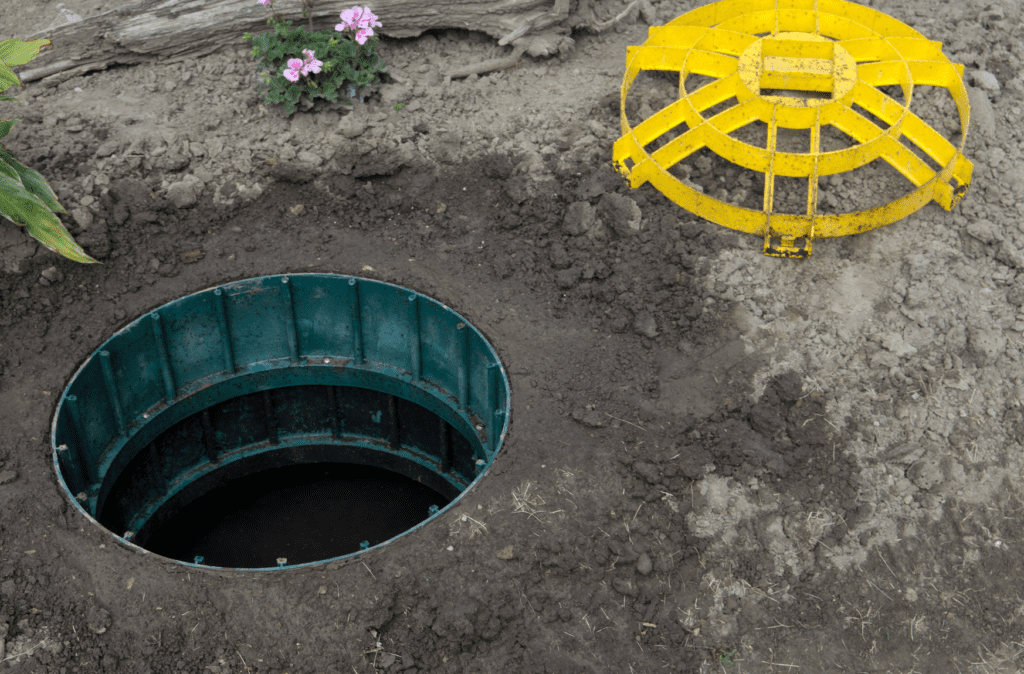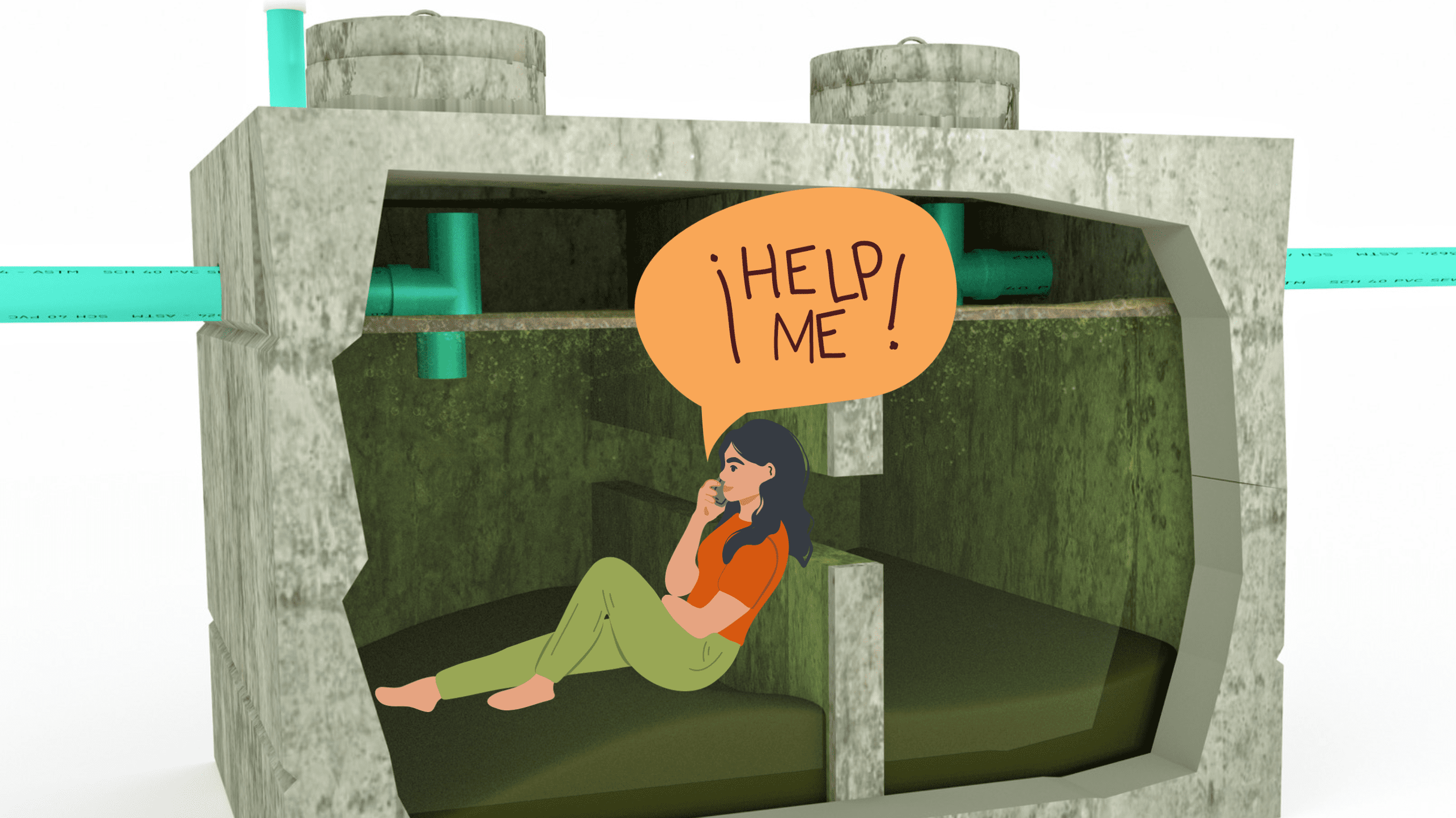So, today’s topic might make you cringe a bit, but trust me, it’s important, especially if you’ve got a septic system at home. We’re going to talk about septic tanks – more specifically, what happens if you take an unplanned dip in one.
Sounds pretty far-fetched, right? But hey, accidents do happen, and knowing the risks is our first step to avoid them.
Septic tanks hardly get a mention when we talk about home safety, but let’s be real, they’re full of waste and can even emit harmful gases.
So, if they’re not looked after or if you’re not careful around them, they can be pretty dangerous.
Imagine falling in – you could get hurt, come into contact with some nasty bacteria and gases, or, worst-case scenario, risk drowning or suffocation.
In this blog post we’ll cover what to do if you find yourself in this scary situation. But most importantly, we’ll talk about how to make sure it never happens to you.
So, let’s jump into the nitty-gritty of septic tanks (just figuratively, promise!) and make sure we’re all staying safe and sound.
Risks Associated with Septic Tanks
General Hazards
Let’s get real – septic tanks are critical for handling waste in many homes, but they do have their risks. For starters, they can produce some pretty dangerous gases like methane, ammonia, and hydrogen sulfide.
Not only do they smell awful as a whole, they’re also toxic. Inhale them and you could be looking at some serious health problems. And in high amounts? They can even explode.
Another thing to consider is the bacteria and other tiny organisms in septic tanks.
Yes, they’re great for breaking down waste, but they’re not so great if they get into an open wound, or if you accidentally swallow or breathe them in. That could lead to some nasty infections.
Specific Risks of Falling into a Septic Tank
Now, imagine falling into a septic tank. All those general hazards? They turn into immediate, life-threatening dangers. The toxic gases could knock you out.
And without someone to pull you out fast, you could suffocate or drown. Not to mention, the fall itself could cause some serious injuries, especially if the tank is deep or if you land awkwardly.
Don’t forget about the raw sewage and bacteria in the tank, either. They could cause some serious infections that might not show up right away.
That’s why it’s super important to get medical help ASAP if you fall in, even if you feel okay after being rescued.
Personal Stories and Examples
You might be thinking, “But who really falls into septic tanks?” Well, it does happen, and more often than you’d think.
There are loads of news stories about both adults and kids accidentally tumbling into septic tanks, usually because the tank cover wasn’t secure or it was old and gave way.
As an example, the San Juan County, New Mexico “has seen five instances in five years of people falling into open septic tanks.“
Here is a recent example. In an unexpected incident, Charles, an Amazon driver, was delivering a package in Apple Valley, California when he experienced a sudden ground collapse.
In an unfortunate turn of events, he found himself inside a septic tank, surrounded by raw sewage. Remarkably, Charles remained composed throughout his rescue by local firefighters.
He even recorded a video while he was inside the septic tank!
Displaying an exceptional level of dedication, he chose to resume his duties after the incident, delivering approximately 50 more packages for Amazon.
Immediate Consequences of Falling into a Septic Tank
Physical Injury Potential
First things first, falling into a septic tank can really hurt. Depending on how deep the tank is and how you land, you could end up with anything from a few cuts and bruises to serious injuries like broken bones, concussions, or even spinal damage.
And let’s not forget – you’re not landing on solid ground, but a gooey mix of liquids and solids, which can make it tough to get your footing and climb out.
Possible Exposure to Harmful Gases and Bacteria
The moment you tumble into a septic tank, you’re in a toxic world. You’ve got harmful gases like methane, ammonia, and hydrogen sulfide, which can cause everything from headaches and feeling sick to passing out or even dying if there’s a lot of it.
And then there’s the bacteria and other nasty pathogens. If they touch your skin, get in your eyes or mouth, or find an open wound, you could end up with a serious infection.
Some of these infections can cause severe illnesses if they’re not treated.
Risk of Drowning or Suffocation
Now, here’s a scary thought: you could drown or suffocate in a septic tank. These tanks are made to hold liquid waste, so if they’re full or nearly full, it’s easy to drown.
Even if the tank isn’t filled to the brim, the toxic gases can knock you out, which ups the risk of suffocating or drowning.
Psychological Impact
We also can’t forget about the psychological toll. Falling into a septic tank can be terrifying, and that panic and fear can make things even worse.
Even after you’re safe, you might deal with post-traumatic stress disorder (PTSD), anxiety, or other mental health issues. You might need counseling right away and mental health support down the line to help you cope.
All of these immediate dangers just go to show how risky it is to fall into a septic tank. It also shows why it’s so important to get help and medical attention fast if it happens, which is something we’ll talk more about in the next sections.
What to Do If You Fall into a Septic Tank

Now, we really hope you never have to deal with this. But just in case, it’s good to know what to do if you or someone else falls into a septic tank. It could save a life.
Immediate Response: Getting Out Safely
First things first – get out of the tank as fast and safely as you can. If you can, keep your mouth and eyes shut to avoid the nasty gases and bacteria.
Try to stay cool and yell for help and if you’ve got a phone, call for help.
If you become aware of the incident, don’t try to help by jumping into the tank. You could just end up with two victims instead of one.
Call the emergency services straight away. If you can, give them something like a rope or a long pole to help them stay afloat until help gets there.
Seeking Immediate Medical Help
Once you’re out of the tank, you need to get medical help right away. Even if you can’t see any injuries or you feel okay, the waste and gases in the tank can seriously harm your health.
Make sure to tell the doctors about the incident so they can check you for infections and toxic exposure.
Mental Health Considerations
Falling into a septic tank can be really traumatic, and it’s okay to feel shocked, scared, and upset. If you’re still feeling anxious or depressed after a while, or if you start having nightmares or flashbacks, it’s a good idea to see a mental health professional.
Getting help early on can really help with the long-term effects of the trauma.
Prevention: How to Avoid Falling into a Septic Tank
When it comes to septic tank risks, the best defense is a good offense. So, here are some key steps you can take to stay safe.
Routine Maintenance and Inspection
Keeping your septic tank in tip-top shape isn’t just good for the tank, it’s good for your safety. Get a pro to check it out at least once every three years.
If you’ve got a big family or a system with mechanical parts, you should do it every year.
These check-ups let the pros look over the tank’s structure, like the condition of the cover, which is often where problems start.
If they find anything wrong, they can fix it right away, helping avoid any nasty surprises.
Safety Measures Around Septic Tanks

Always keep your septic tank and its access points securely covered. The covers should be heavy or locked to stop them from being moved accidentally or opened without permission.
Think about putting up safety barriers or a fence around the area, especially if you have kids or pets.
Never walk or drive heavy machinery over the septic tank area. The weight could damage the tank or cover and cause a collapse.
Make sure to clearly mark the area so everyone in the house knows to steer clear.
To clearly mark the area, we decided to place nautical poles around the septic tank area, as you can see in the picture. We did this not only for safety, but also for looks.
Educating Children and Adults About the Dangers
Education is key in prevention. Make sure your family, especially kids, understand how dangerous septic tanks can be. They need to know not to play near or on the septic tank area or try to open the tank.
Adults need to understand the dangers too. This includes knowing about the risks of toxic gases, the importance of professional maintenance, and what to do if there’s an accident.
The best way to avoid the nightmare of falling into a septic tank is prevention. With the right maintenance, safety measures, and education, we can keep these accidents extremely rare and our homes safe for everyone.
===>Related: Can you pour a concrete patio over a septic tank?
Conclusion
Falling into a septic tank might seem like a one-in-a-million chance, but these accidents do happen, and they can be really bad. But with the right knowledge, safety measures, and action plans, you can keep these risks in check.
Safety isn’t just about stopping accidents, it’s about feeling safe and secure in our own homes and neighborhoods. By making septic tank safety a priority, you’re not just protecting your own family, you’re also making your community a safer place for everyone.

